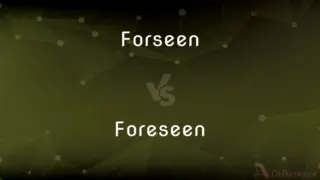Blaim vs. Blame — Which is Correct Spelling?
By Tayyaba Rehman — Updated on March 20, 2024
"Blaim" is an incorrect spelling, while "Blame" is correct. "Blame" refers to holding someone responsible for a fault or wrong.

Table of Contents
Which is correct: Blaim or Blame
How to spell Blame?

Blaim
Incorrect Spelling

Blame
Correct Spelling
ADVERTISEMENT
Key Differences
When unsure, refer to trusted dictionaries which will always have "blame" and not "blaim."
Remember the phrase "take the blame," which is commonly used in everyday language.
Think of "blame" rhyming with "claim" – both have "a" after the initial consonant.
Use mnemonic devices like "Big Lions Always Make Errors" to remember the correct sequence of letters in "blame."
Visualize the correct spelling in a sentence like "She is to blame."
ADVERTISEMENT
How Do You Spell Blame Correctly?
Incorrect: She tries to blaim her mistakes on others.
Correct: She tries to blame her mistakes on others.
Incorrect: I can't blaim you for wanting to leave early.
Correct: I can't blame you for wanting to leave early.
Incorrect: They often blaim their tools instead of their skills.
Correct: They often blame their tools instead of their skills.
Blame Definitions
"Blame" means to accuse someone of doing something wrong.
He was quick to blame his friend for the mistake.
"Blame" can indicate the expression of disapproval or reproach.
She cast blame on them for not trying hard enough.
In a broader sense, "blame" can also mean the state of being responsible for an error or mistake.
The entire blame was placed on the faulty machinery.
"Blame" can also mean the responsibility for a fault or wrong.
The blame for the accident lies with the driver.
As a noun, "blame" refers to the act of accusing or condemning.
She accepted the blame without arguing.
Blame is the act of censuring, holding responsible, making negative statements about an individual or group that their action or actions are socially or morally irresponsible, the opposite of praise. When someone is morally responsible for doing something wrong, their action is blameworthy.
To consider responsible for a misdeed, failure, or undesirable outcome
Blamed the coach for the loss.
Blamed alcohol for his bad behavior.
To find fault with; criticize
I can't blame you for wanting your fair share.
To place responsibility for (something)
Blamed the crisis on poor planning.
The state of being responsible for a fault or error; culpability.
Censure; condemnation
"Hoover hazarded more in the way of federal response to economic crisis than any president before him, but his efforts were not enough to divert the blame and wrath of the American people" (Michael B. Stoff).
Censure.
Blame came from all directions.
Culpability for something negative or undesirable.
The blame for starting the fire lies with the arsonist.
Responsibility for something meriting censure.
They accepted the blame, but it was an accident.
(computing) A source control feature that can show which user was responsible for a particular portion of the source code.
To censure (someone or something); to criticize.
(obsolete) To bring into disrepute.
To assert or consider that someone is the cause of something negative; to place blame, to attribute responsibility (for something negative or for doing something negative).
The student driver was blamed for the accident.
To assert the cause of some bad event.
We blamed the accident on the student driver.
To censure; to express disapprobation of; to find fault with; to reproach.
We have none to blame but ourselves.
To bring reproach upon; to blemish.
She . . . blamed her noble blood.
You were to blame, I must be plain with you.
An expression of disapprobation fir something deemed to be wrong; imputation of fault; censure.
Let me bear the blame forever.
That which is deserving of censure or disapprobation; culpability; fault; crime; sin.
Holy and without blame before him in love.
Hurt; injury.
An accusation that you are responsible for some lapse or misdeed;
His incrimination was based on my testimony
The police laid the blame on on the driver
Put or pin the blame on
Harass with constant criticism;
Don't always pick on your little brother
Attribute responsibility to;
We blamed the accident on her
The tragedy was charged to her inexperience
Blame Meaning in a Sentence
The coach refused to blame the loss on bad luck.
Why do you always blame me for things I didn't do?
You can't blame the cold weather for not exercising.
Many people blame their unhappiness on external circumstances.
She didn't want to blame her brother for breaking the vase.
He took the blame for the mistake to protect his team.
The company was quick to blame technical issues for the delay.
Everyone seems to blame the new policy for the confusion.
It's easy to blame others instead of looking at your own faults.
She tried not to blame herself for the accident.
You shouldn't blame the dog for eating the cake if you left it within reach.
The report seemed to blame the weather for the crop failure.
No one wanted to take the blame for losing the keys.
It's unfair to blame the entire team for one person's mistake.
He was looking for someone to blame for his failures.
After the game, the players did not blame the referee for the defeat.
Historians sometimes blame economic factors for major historical events.
Parents often get the blame for their children's misbehavior.
Some blame modern technology for the lack of personal communication.
Many blame stress for their health issues.
Critics blame the new law for causing confusion among citizens.
It's not right to blame your problems on your upbringing.
It's easier to blame circumstances than to change your behavior.
It's common to blame traffic for being late.
Blame Idioms & Phrases
To lay the blame on someone
To assign responsibility for a mistake to someone.
When the project failed, the manager laid the blame on his team.
To place the blame
Similar to laying the blame, it means to assign responsibility for something bad.
The teacher placed the blame for the disturbance on a few noisy students.
Blame it on the rain
Using an uncontrollable situation as the reason for failure.
They lost the match and blamed it on the rain affecting their play.
To shift the blame
To transfer responsibility for a fault or mistake to someone else.
He tried to shift the blame onto his colleague when the mistake was discovered.
To take the blame
To accept responsibility for a fault or mistake.
She decided to take the blame for the misunderstanding, even though it wasn't entirely her fault.
To accept the blame
To acknowledge one's responsibility for a mistake.
The CEO accepted the blame for the company's financial losses.
To be to blame
To be responsible for a mistake or bad situation.
He is to blame for the confusion because he gave us the wrong instructions.
Blame game
A situation where people try to blame others instead of trying to resolve a problem.
After the event's failure, the organizing committee started a blame game.
Beyond blame
Describing a situation or person that cannot be blamed for something.
The emergency services were beyond blame for the delay, as they responded as quickly as possible.
Common Curiosities
Which vowel is used before Blame?
No specific vowel is consistently used before "blame."
Why is it called Blame?
The term "blame" originates from Old French "blamer" or "blasmer," meaning to rebuke.
What is the pronunciation of Blame?
Blame is pronounced as /bleɪm/.
What is the verb form of Blame?
The verb form is "blame" (e.g., I blame him).
What is the singular form of Blame?
The singular form is "blame."
What is the root word of Blame?
The root word is "blame" itself, derived from Old French "blamer."
What is the plural form of Blame?
The plural form is "blames" when referring to multiple instances of criticism or accusations.
Which preposition is used with Blame?
"For" is often used with blame, as in "blame someone for something."
Which article is used with Blame?
Both "a" and "the" can be used with "blame" depending on the context.
Is Blame an adverb?
No, "blame" is not an adverb.
Which conjunction is used with Blame?
No specific conjunction is consistently associated with "blame."
Is Blame a noun or adjective?
"Blame" is primarily a noun but can also be a verb.
Is Blame an abstract noun?
Yes, as it represents an idea or concept rather than a tangible object.
Is the Blame term a metaphor?
By itself, no. But it can be used metaphorically in certain contexts.
Is the word Blame is imperative?
No, "blame" is not an imperative verb form.
Is the word “Blame” a Direct object or an Indirect object?
"Blame" can be used as a direct object. For instance, "She took the blame."
Is Blame a negative or positive word?
It is generally considered a negative word.
How many syllables are in Blame?
There is one syllable in "blame."
Which determiner is used with Blame?
Determiners such as "the," "his," "her," "my," and "this" can be used with "blame."
What is a stressed syllable in Blame?
The entire word "blame" is stressed, given it's a single-syllable word.
What is the second form of Blame?
The second form is "blamed."
How is Blame used in a sentence?
"Many blame the government for the economic downturn."
Is Blame a vowel or consonant?
"Blame" is a word consisting of both vowels and consonants.
Is Blame a countable noun?
In contexts like "assigning blames," it can be countable, but it's often used as an uncountable noun.
How do we divide Blame into syllables?
"Blame" is not divided as it's a single-syllable word.
What part of speech is Blame?
"Blame" can be a noun or a verb.
What is another term for Blame?
Another term could be "censure" or "accuse."
What is the third form of Blame?
The third form is "blamed."
Is Blame a collective noun?
No, it's not a collective noun.
Is the word Blame is Gerund?
No, "blame" is not a gerund. However, "blaming" can serve as a gerund.
What is the opposite of Blame?
The opposite could be "praise" or "commend."
What is the first form of Blame?
The first form is "blame."
Share Your Discovery

Previous Comparison
Developped vs. Developed
Next Comparison
Descuss vs. DiscussAuthor Spotlight
Written by
Tayyaba RehmanTayyaba Rehman is a distinguished writer, currently serving as a primary contributor to askdifference.com. As a researcher in semantics and etymology, Tayyaba's passion for the complexity of languages and their distinctions has found a perfect home on the platform. Tayyaba delves into the intricacies of language, distinguishing between commonly confused words and phrases, thereby providing clarity for readers worldwide.








































